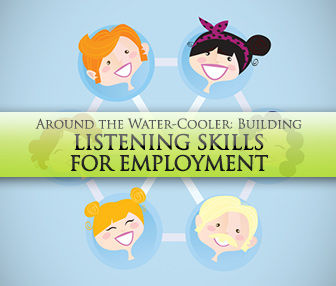Summerís Top Activity to Take Outside: Small Talk


If this is the focus of one of your groups, there is a lot you can do to develop listening and speaking skills with career-motivated activities. Help learners find success around the water-cooler by devising listening skills geared for employment.

It is vital that students are able to talk about their skills and interests, but also to display fluency in understanding. By approaching interviewing with a few different methods, learners will begin to hone natural speaking under pressure as well as pointed listening skills. One way to approach this is to set up a date in the future when you will host a mock job fair or networking event. It doesn't have to be formal with employers in your area. Simply bring in a few people the students have never met, and they can represent a company or job field that the students have showed interest in. You could have the guests perform short one-on-one interviews with the students and provide feedback, or devise a panel so the students ask the guests questions as if they are employers. You could also try a mingling exercise that mirrors a networking event. Mingling is a great use of time, but you need to be sure that all students are participating and getting the requisite practice. You might want to have some kind of incentive like small prizes for the three students who make the best impression or for those who have the most interesting interaction. However you decide to arrange the event, the weeks leading up to this day are very important. There are lots of elements to touch upon in lessons before the networking event. You'll want to gear students up for talking about themselves, listening to others, and devising questions.
A huge element in attaining a job or maintaining relationships once you get a job is the ability to interact with a lot of different people. Structuring lessons around small talk will be beneficial to any student on the prowl for employment. Small talk has huge ramifications for both speaking and listening skills. It shows that students are able to use natural language, listen to others, and comment accordingly. Students should first analyze what topics are appropriate for small talk, and try them out in a natural setting. Topics could include: the weather, comments on a commonality, or asking a benign question. Practice in class by discussing small talk they have overheard, performing role plays or talking in pairs. After they have gotten their feet wet in class, a great place for the students to try their hand at small talk is the grocery store. There is ample time while waiting in line or while getting rung up. Cashiers are particularly used to small talk, so it is a safe way for students to try out some natural interaction. Give them some guidelines and have each of them report back on their experience. Other opportunities ripe for small talk might be a waitress, the local coffee or tea house, or just about anywhere where you have to pay for anything. If students are in their native country, you may want to have them (embarrassingly) look for foreigners that they could approach in a non-creepy way to try out some of the same small talk elements.
Devise role plays and group work that allow students to critique one another and to work together to approach problems. Structure many different exercises around interviewing to develop targeted listening and speaking. First off, provide the ten most asked interview questions for your region.
A few examples are:
Obviously these questions are difficult for native speakers, so students need a lot of practice. Several aspects should be approached that combine listening and speaking. A few are: vocabulary, tone, etiquette, content, analysis of speaking, and understanding of natural language. Students can prepare answers that are both general as well as specifics. Students should also listen intently and make sure they are hearing the speaker accurately. If they don't understand or if there is a miscommunication, they should ask for clarification and apologize.
Many students have great difficulty talking about themselves, especially when it comes to selling themselves in job interviews. Before they can be successful at interviewing or networking, they first must analyze their own skills and decide what attributes they would like to bring into focus. Through listening to other students discuss their skills, each student will gain the confidence to sell themselves. This can be done by presenting new vocabulary as a jumping off point for discussion. Create a list of twenty attributes that are important in the workplace and have students pick and choose which ones apply to them. Then they can come up with a few examples for each one to display the skill. These could include: honest/loyal/trustworthy, punctual, hard-working, innovative, creative, driven, and people-person. You'll be surprised with what students come up with on their own so definitely involve them in the creation of the list. Allow them to practice explaining their skills in front of the group and answer questions. Also consider giving them the option to devise their one-minute elevator pitch, which is a description of themselves that they could communicate in the time it takes to ride the elevator.
Give students as much real-world practice as you can, and be sure that each exercise strengthens and challenges their listening abilities.